EngageMedia Blog
Network Building at the Southeast Asia Video for Change Forum
 The Freedom Film Festival is considered to be the most established human rights and environmental film event in the region, bringing together critical films and filmmakers for the past 14 years. Its organizers, Pusat KOMAS, who are a member of the global Video4Change network, spearheaded the idea of holding a localized forum after attending the 2nd convening of the network in Mexico last year.
The Freedom Film Festival is considered to be the most established human rights and environmental film event in the region, bringing together critical films and filmmakers for the past 14 years. Its organizers, Pusat KOMAS, who are a member of the global Video4Change network, spearheaded the idea of holding a localized forum after attending the 2nd convening of the network in Mexico last year.
The three-day event began with a public screening of films from Sabah, to West Papua and to Myanmar, addressing issues such as environmental crises, women’s rights, religious freedom, and the social realities of the LGBT community. The screenings closed with the film ‘Kenya: A Guidebook to Impunity’, produced by fellow Video4Change network members InformAction.
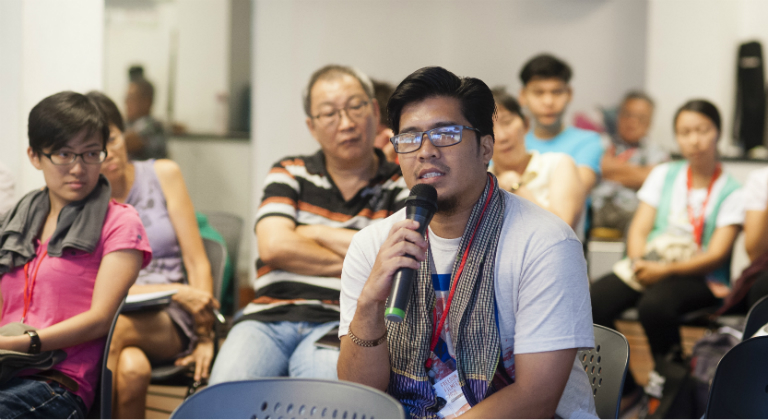
The film served as a starting point for the discussion conducted the following day on the role of video in elections monitoring in Southeast Asia. All the participants agreed that video-based monitoring in their home countries was done more sporadically, and found inspiration from the Kenyan film to plan ahead for a more concerted documentation effort.
Sessions continued with a presentation on ‘Video as Evidence’ and related tools by Prakkash from WITNESS. Seelan from EngageMedia then shared a presentation titled ‘Beyond the Festivals: Video for Social Change and Impact’, which included key aspects of guides such as BRITDOC’s Impact Field Guide, Horticulture Tools by the Active Voice Lab, and the Video4Change Impact Cookbook. It was encouraging to note that our presentation was used by one of the attendees in an Asia Indigenous People's Pact workshop in Thailand the very next weekend.
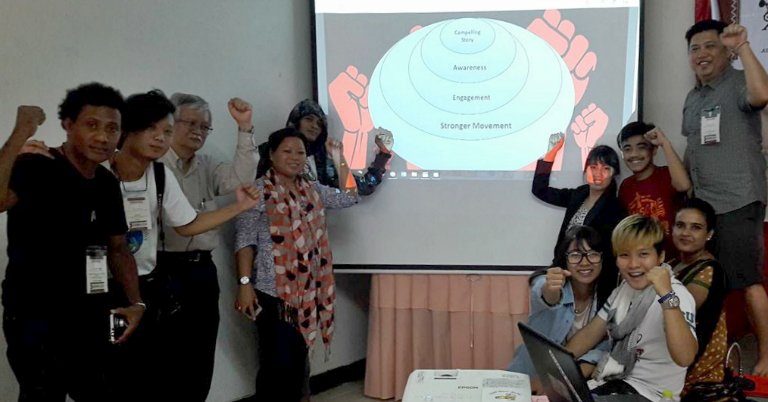
The final day featured an open-to-public dialogue titled, ‘Dealing with the Cut’, where a panel of filmmakers shared their experiences with film censorship.
Knowledge exchanged over the course of the forum informed the closing meeting to follow up on some common areas where various participating filmmakers and organizations could work together, and understand how this currently organic network can be developed further.
Video for Social Impact at Myanmar Tech Camps

The first event, which I was also invited to help organize, was the Barcamp in Pyay City, located in the Bago Region. Like many other areas in Myanmar, Pyay faces issues of land grabbing, and so I chose some related content for the camp. On the opening day, July 16, I promoted a dialogue on 'Human Rights Through Documentary'.
As the target audience during my talk were teenagers and high school students, I focused on child and land rights issues by screening the films, ‘Pangarap sa Buhay' from the Philippines and ‘Masters of our Land’ from West Papua.
The discussion that followed was very active because the students were knowledgeable on human rights, and spoke up bravely on the subject. We concluded the session by asking positive questions such as, “How can we cure our society by sharing knowledge?”.

Next, I headed to the Tech for Transparency event at Latpanhla village, Sintguu Township, Mandalay Division. The two-day workshop which started on July 18 was organized by Phanteeyar, USAID and Colors Rainbow.
Colors Rainbow invited both youth and seniors from across Mandalay and Latpanhla to participate in the camp, where I spoke to both groups about the impact of the civil rights movement in their lives and taking action to help their communities with digital storytelling tools.
Using the mobile editing tools I shared, each participant was supported in creating a story, written and recorded on his or her mobile phone. Each story was made accessible online by posting them on their community Facebook page.
With the skills gained during the workshop, the participants from various organizations are now able to share their stories as part of their efforts to seek justice, whether it be in LGBT or civil liberty issues. The camp also provided other valuable tools to civil society and the private sector to enhance the technical assistance they are receiving through ongoing USAID programs.
EngageMedia looks forward to the next event where it can contribute to positive social change in Myanmar through video and technology.
The Right To Be Forgotten at APrIGF 2016
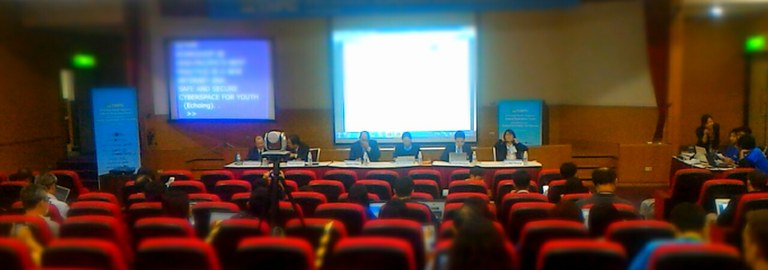
In his opening address at the Asia Pacific Regional Internet Governance Forum (APrIGF) 2016 in Taiwan, Markus Kummer, its Executive Coordinator, mentioned that for many years, the IGF sees itself as a forum for strategy but applies no pressure on itself to make decisions. There have been no tangible outcomes, only some recommendations to be pushed through some mechanisms such as the UN process. In short, the IGF is a forum for diplomacy.
With that in mind, some of the forum participants attended a discussion on the Right To Be Forgotten (RTBF), a concept initially discussed and implemented in the European Union and Argentina, and intended to allow individuals to "determine the development of their life in an autonomous way, without being perpetually or periodically stigmatized as a consequence of a specific action performed in the past."
The dialogue on RTBF included the perspectives of different stakeholders considering the impacts on access to information, the shifting of decision-making to technology companies, and the right of an individual to privacy and security. It aimed to go through the legal, technical, and societal implications of RTBF decisions for internet design, access, and use.
The session was also part of a global collaboration between academics, NGO researchers, and information professionals who came together to take a closer look at RTBF rulings around the world. They addressed challenges arising from the terminology and implementation of the rulings and how they are shaping a "New Internet Era".

I'd like to highlight some of the points brought up that I found of interest, especially from Prof. Kyung Sin Park from Korea, who asked about data ownership. Today, most of us are frankly unfamiliar with who or which entities actually own our online data. This includes all our status updates, images and audio files that have been uploaded to dozens of apps, services, and social media.
When talking about RTBF, Prof. Kyung added that we also should consider relevance. Public interest makes it relevant to fulfill the RTBF, because people are very diverse and the right can protect a person's past life and prevent discrimination based on it. The question was also raised on how we differentiate private identity with RBTF.
In another comment, Dr. Monika Zalnieriute from the University of Melbourne emphasized on the private sector and the government privatization of human rights. There is also the angle from which historians and librarians see issues with RTBF, in the sense that history must be protected so that it can be used by researchers.
Smita Vanniyar, Research and Communications Officer from the Indian organisation Point of View, complained against the real name policy that has been advocated by Facebook. From civil society's perspective, especially people with different sexual identities and orientations, some of whom have dual identities need protection from societal threats. People who are queer, for example, are in need of both the freedom of expression and the freedom of sexual expression.
At the end of discussion, almost all of the participants came to an agreement that the right to be anonymous is similar and equal to other human rights, and there should not be any rights are more or less limited than another.
Video streams and thematic summary reports from IGF 2016 are available here.
The Future of Protecting Journalists
The aftershock of Snowden’s revelations seems to have died down. Other than a few more journalists who are now using encrypted emails, nothing much has changed. Security experts are still juggling terms such as SecureDrop, TOR, PGP and many more, but just how many media professionals are paying attention to them?
Journalists around the globe are increasingly being harassed, censored, monitored or even worse, have been stopped from doing their work. According to Reporters Without Borders, 35 journalists have been killed and 167 others imprisoned in 2016 alone.
However, according to our work in the field, we note that the threats faced by journalists are mostly related to local actors and not some form of high-level surveillance. Local thugs, mayors, politicians and landlords have shown themselves to be the most common enemies.
At the same time, the tools used to conduct these acts of surveillance are becoming cheaper and easier to obtain and use. So while journalists should discuss and investigate larger issues, they should pay more attention to their local challenges.
There's also this new phenomena, where journalists are finding it very difficult to protect their sources, the people who are providing them data and information. Journalists need to be more careful about their digital footprints and the kinds of information they are releasing in stories. They also need to do more to protect their research, data, electronic devices, work spaces, and on/offline identities.
With regards to digital security in the office, a few key questions need to be answered:
- What is the protocol for using encrypted emails?
- Who will people refer to if there are security issues?
- How will they contact this expert or reliable individual?
- Do they live in a country where encryption is outlawed?
Journalists are also currently using more chat applications in their smart phones than laptops. Here, it’s important that they choose between Whatsapp and Signal, which are already equipped with end-to-end encryption, making them far more secure than free-service email, with Whatsapp looking to soon integrate fingerprint verification. Beyond these tools, are they even using secure passwords? Knowledge in creating better passwords is actually just as, if not more important, than using complex applications.
Most importantly, addressing all the above issues requires a change in behavior towards security, which is usually the hardest to achieve. The journalists of the world will hopefully not have to see another prominent victim like Snowden for that to happen.
Screening Papuan Films in Yogyakarta

On 21 April, 6 short films by Papuan filmmakers and activists opened Jagongan Media Rakyat 2016 (The People’s Media Festival) in Yogyakarta, Indonesia.
The films from EngageMedia's Papuan Voices collection included Save The Karon, Papuan School, Pearl In The Noken, Mama Mariode and Master of Our Land. The film Perempuan dan Miras (Women and Alcohol) by the Papua Pride community was also screened.
The motive of the screening was to inform to people outside Papua about what exactly was happening inside it. Richard Suwae, one of the founders of Papua Pride, commented that film is the best medium to transfer knowledge and information, and that it’s much easier to distribute. They hope that through film, they can increase solidarity among Papuans.
Both organizations aim to foster a positive perception about the Papuan people, as we've observed that in recent times, the media tends to report news that portrays them in a more negative light.
In the same week, Papuan Voices was also screened during a monthly discussion as part of Festival Film Pelajar Yogyakarta (Yogyakarta Student Film Festival). The organizer of the event wanted to show films made by Papuans, as most films about the province are made by people from outside it.
Snowden: Systemic Problems Need Systemic Change
It’s not everyday that we can see an academic and a security expert turned whistleblower talk whilst being completely able to understand and complement each another. This is why the events that unfolded during Rightscon 2016 were interesting.
The academic, Ronald J. Deibert, Professor of Political Science and Director of The Citizen Lab, opened the discussion with several topics that have been much explored before, one of them being the special place and relationship, and more specifically the responsibility, of academia on the issue of public security versus the state. The security expert, Edward Snowden, who is now residing in Moscow, Russia, talked to the hundreds of participants present at the discussion with great enthusiasm, as always. He elaborated upon the meaning of current security threats and the challenges they pose to culture and education.
In Snowden’s opinion, technology can protect freedom but it can also become a threat to humanity. He said that right now, even though a great revelation regarding the need for online security has occurred in Europe, little has been done to help people in China or North Korea, where the public lives in almost total isolation.
Both speakers agreed that we need to develop a multi-perspective approach to strengthen civil society’s defense against intrusion from state and non-state intelligence bodies. Professor Ronald specifically mentioned how the role to develop such an approach can fall upon the people who are active in universities around the globe. They can offer help by conducting research based on their own institutions, in order for the movement to benefit from findings based on data and proven methodology. Furthermore, these kind of activities will not only inspire technicians but also law students and their respective departments.
Ronald stated that funds for doing corporate research are much greater compared to the funds going to universities, and with big money, the corporate world can comparatively do a lot more things. But still there's a need and a challenge for academia to continue their research in campuses he said, pointing out that most of the popular software and internet infrastructure we are using today sprang from campuses throughout the Western hemisphere, largely due to the freedom and space provided by academic culture. He also suggested using fellowship programs to attract new students to study this field.
Ronald believes that this kind of academia-inspired movement can be molded to create a civil society intelligence that can counter state intelligence. The movement's task is to gather data and find evidence that will work against state intelligence and private security companies, especially to help prove how certain state intelligence activities conflict with fundamental human rights.
Related to this, Snowden added that such a movement will need to work alongside journalists, especially now since they have been heavily targeted by the state. On the other side, journalists can become spokespersons of the movement, getting the word out to the public.
Snowden showed a trend of how the state is becoming more and more powerful. Practices like inserting spyware or malware concealed within an update and/or software upgrade becoming more common. Privacy rights are shun everyday all over the world. This, in turn, creates cultural and academic questions about why this is happening, which the younger generation will especially need to be confronted by.
For Snowden, it's hard to explain why the world is seemingly becoming stricter with ever increasing restrictions to freedom. A culture of 24-hour surveillance has become normalized, so be careful. Remember to look over your shoulder.
Seeing Impact in Progress at Good Pitch Europe

On 24 May 2016, Andrew Lowenthal, Director of EngageMedia, and myself, Communications and Outreach Coordinator, attended the 4th installment of Good Pitch Europe in Stockholm, Sweden. The event brought together 7 feature-length films, over 170 organizations and 259 participants.
Good Pitch, which was originally developed by Britdoc and the Sundance Documentary Institute in 2008, aims to amplify the impact of documentary films that address social and environmental issues.
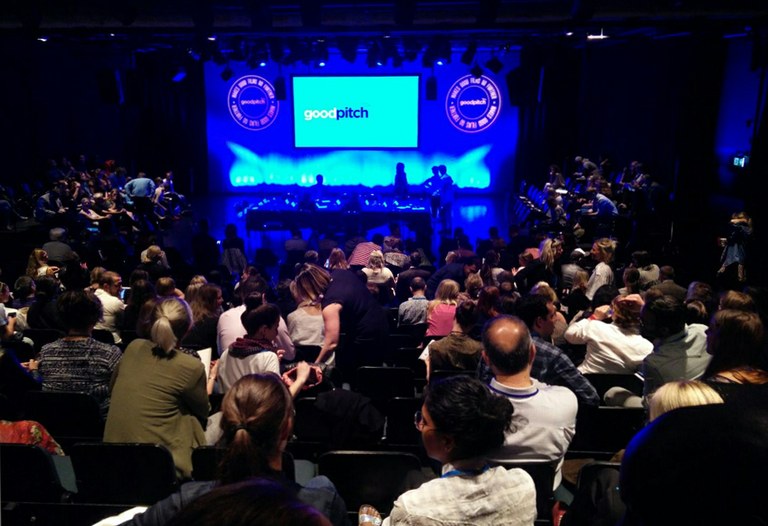
Good Pitch is different to standard pitching forums where filmmakers ask for financial support and look for distribution avenues. It instead seeks to forge partnerships between filmmakers and a wide range of stakeholders, including NGOS, philanthropists, social entrepreneurs, corporate partners, broadcasters, educators and policy-makers, creating coalitions and campaigns around environmental and social issues, which are good for the partners, good for the films and good for society.
This was my first Good Pitch experience, which I’ve heard so much about over recent years through the global Video for Change community and through some of the acclaimed films it has supported, such as Citizen Four, No Fire Zone and The Look of Silence.

As Good Pitch2 is being hosted for the first time in Southeast Asia next year by Indonesian organization In-Docs, and which EngageMedia is an outreach partner of, it was especially useful for me to learn from the organizers and participants, and witness the process first-hand. After groups of production teams had presented their projects, which were mostly 80% completed, foundations, media outlets, organizations and even companies such as Google and Vine pledged financial and distribution support. It would be amazing to see how we could get similar support for critical films from the region.
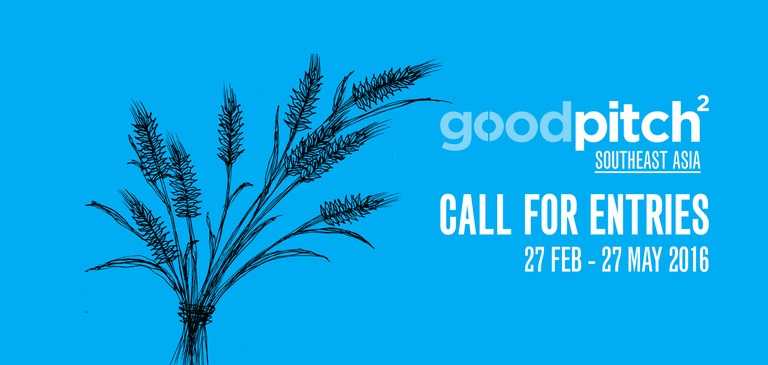
However, the one-day event itself is just a fraction of what goes into the work for Good Pitch. Leading up to Jakarta in May 2017, five films will be selected to receive mentorship such as impact and pitching workshops, outreach support which includes connecting the films to hundreds of potential allies that can help them reach wider (or more precise) audiences and ultimately aiding them to produce more real and lasting impact. And we’re looking very forward to being a part of making all that happen!
Battle Against Bali Reclamation

Earlier this year, a group of protesters rode from Jakarta to Bali on bicycles as an effort to raise awareness of an environmentally damaging reclamation plan. This is just one action from the protest campaign that's been held for the past two years, that has been doing everything in its power to ensure that Benoa Bay in Bali, Indonesia, does not become a giant tourist playground.
Before that event, thousands of people including activists, NGOs, artists, students, expats, tourists, local communities, celebrities and Indonesians living abroad gathered in front of the Bali Governor’s office demonstrating against the plan. These are both the kind of mass actions being carried out by the growing For Bali (or #FORBALI) movement.
For Bali itself is a civil community which consists of students, NGOs activists, artists, youth, musicians, academics, environmental consultants and other individuals who believe that the Tanjong Benoa reclamation plan is destructive towards nature.
Alongside demonstrations, the campaign also garners people’s participation through popular media such as posters, documentary films, comics and it even launched a song titled, 'Bali Tolak Reklamasi', composed by well-known Indonesian musicians Superman Is Dead, The Bullhead, Nymphea, Gold Voice and Nosstress.

The issue first came to light in December 2012 when the Governor of Bali, Made Mangku, secretly signed a legal letter to give permission to PT. Tirta Wahana Bali International to reclaim Benoa Bay, which is in the Southern part of Bali and along the Indian Ocean. The corporation aims to build a huge tourist district and a theme park similar to Disneyland, together with an international hospital, college, marina, and retail district, each complete with their own personal docks and yachts, hotels, apartments and golf courses.
Many studies have stated that the corporation should not conduct the reclamation as it will cause several issues such as flooding, increased risk of drowning, social and cultural disorder, and serious harm to biodiversity in sea and on land.

Benoa Bay is also a sacred area because of the presence of 60 natural sites, including 19 estuaries and 17 small islands that emerge during the low tide. The plan to "develop" 700 hectares of the bay will damage all of these sacred sites.
The For Bali movement is growing throughout the world, with artists, musicians, activists and filmmakers protesting on the streets to pressure the Indonesian government to stop the reclamation.

Open Call: Good Pitch² Southeast Asia
Conceptualized by BRITDOC and Sundance Documentary Institute, Good Pitch is not just an ordinary pitching forum where filmmakers ask for financial support and search for distribution avenues. Good Pitch forges powerful partnerships between multi-disciplinary stakeholders – NGOs, philanthropists, social entrepreneurs, corporate / brand partners, broadcasters, educators, policy makers, and any changemakers who can utilize great documentary films to make their intended impact in the society.

Since the first international event in 2009, Good Pitch has spread around the world in satellite forums called Good Pitch² (Good Pitch Squared). Good Pitch² Southeast Asia will be held in Jakarta in May 2017. The call for documentary projects will open in March 2016.
Five films will be selected to receive various mentorship and support, including an IMPACT workshop, outreach support, pitching workshop, and an opportunity to pitch the project in front of powerful potential alliances that can help the documentaries reach an impact.

For more information on Good Pitch² Southeast Asia, contact goodpitch@in-docs.org
Funding Partners

Outreach Partner

Made by

Collaborate to Create: Tech Camp Myanmar 2016
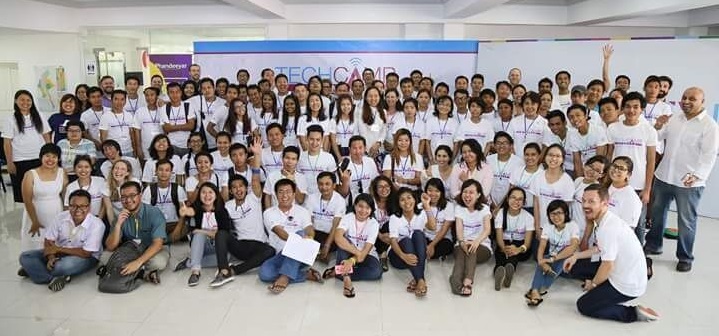
In partnership with the U.S. Embassy and the Innovation Lab: Phanteeyar, this Tech Camp aimed to promote inclusiveness in Myanmar by creating technology strategies for a new Myanmar. Among the many topics that were discussed were data collection, citizen journalism, online/offline community organizing, digital privacy, data visualization, tools for emergency and data mapping.
International trainers from BBC, RFA, the Carter Centre, Change.org, Open Development Initiative, IRI and ICT4Peace showcased various tech solutions and strategies that could potentially aid the growing democracy. Local trainers like myself and others from different organizations also attended and trained at the camp.

Esra Dogrmaci from the BBC and I specifically trained on 'Social Video and Podcast Production’, where we introduced a selection of mobile video editing apps for iOS and Android. The focus of our session was on how to produce short and effective campaign videos for access on slow internet connections. We also spoke on tactics for reaching new audiences via social media, specifically for mobile video
Esra suggested using text-based video tools because they don’t require getting a good voiceover or presenter. The strength of making text-based video is that everyone can easily understand concepts and ideas through a combination of text and photographs.

Our participants had a lot of fun producing content using the apps and techniques we recommended, and were really excited to finish their projects within the given time frame. The four groups made up of our participants worked on themes such as drug abuse, child rights and caring for the elderly.
One participant from the Pat Jasan organization, which is conducting an anti-drug campaign in the Kachin area, shared that they’d like to work on a documentary on drug abuse because it’s a serious problem there. He felt that the session was very valuable for him, adding that although he can only produce short mobile videos now, he hopes that he’ll be able to produce documentary films with professional editing software.
Tech Camp Myanmar was a great platform to bring innovative groups of people together, engage them in meaningful training, and kick-start a conversation on the importance of digital communication strategies. Welcome to the New Myanmar!
 Subscribe to blog feed
Subscribe to blog feed